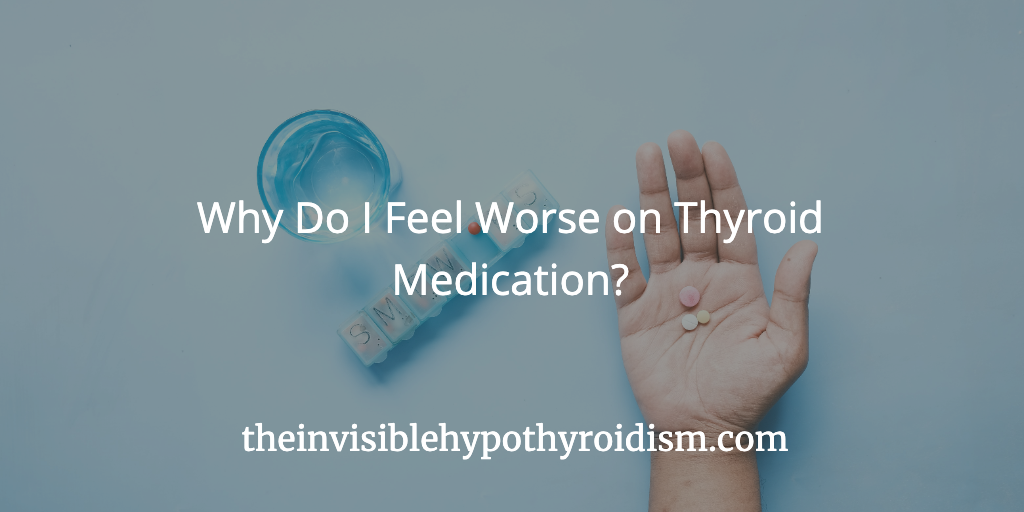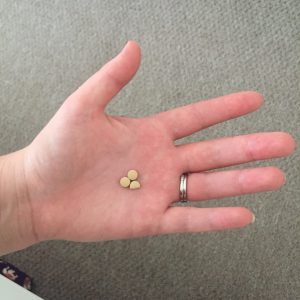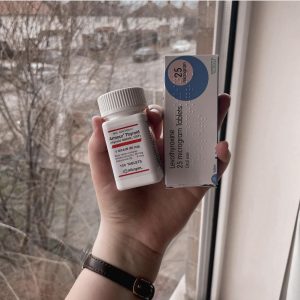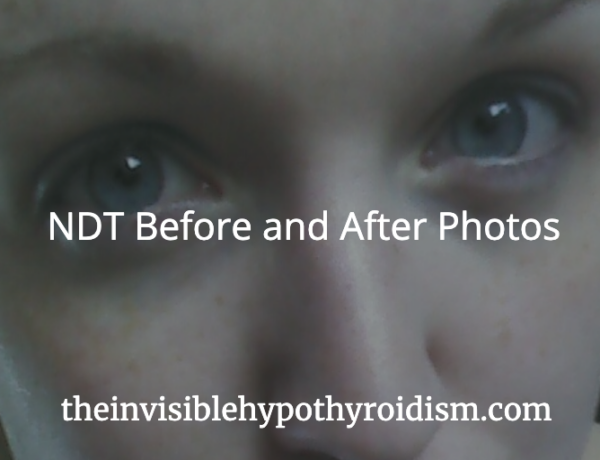I have conversations like this more often than you would believe:
“Can I just stop taking my thyroid meds?”
“Why would you want to?”
“They’re not working anyway. I still have symptoms and I think I actually feel worse. So what’s the point?”
Usually in response to me sharing this article: What Happens if You Stop Taking Thyroid Medication.
People will counter-argue the fact that I don’t endorse the sudden stopping of thyroid hormone replacement medication (without a doctor’s support and guidance) with the point that they feel worse taking them anyway.
My point is this: you were put on this medication presumably because your thyroid hormone levels were low.
Low thyroid hormone levels left untreated for a long time can lead to:
- Abnormal blood pressure
- An increased risk of heart disease
- An increased risk of infection
- Weight gain
- Depression and anxiety
- Hair loss
- Infertility, miscarriage, stillbirth
- Irregular periods or periods that are too heavy or too light
- Extreme fatigue and an inability to handle exercise
- Muscle weakness
- Joint and muscle aches and pains
- Numbness in limbs
- Intolerance to exercise
- Recurrent low vitamin levels such as B12, D, Folate, Iron and Ferritin that can cause a whole load of symptoms in their own right
- Feeling cold all the time
- Brain function issues such as brain fog, memory issues, degeneration and confusion
- High cholesterol
- Constipation
- And fatally: myxoedema coma. This is a loss of brain function as a result of longstanding, severely low level of thyroid hormones. It is considered a life-threatening complication of hypothyroidism that develops over quite a long amount of time.
There are countless stories out there from thyroid patients who stopped their medication and ended up in hospital severely unwell months later.
If you stop taking your thyroid medication, you open yourself up to the above risks.
Therefore, if you feel that your medication isn’t helping, it doesn’t make sense to stop them, but instead, we should be asking why they’re not helping you.
Simply stopping them isn’t going to do anything positive for your hypothyroidism. You’re just likely to get in to an even worse state of health over time. If you stop taking your medication, you can expect your thyroid symptoms such as fatigue, muscle pain, brain fog and hair loss for example, to return and / or worsen.
The half-life of Levothyroxine is 6-7 days, which means it takes about 4-5 weeks for your body to clear itself of levothyroxine completely. [1]
Therefore, you may feel fine for a month or two before you start to feel more unwell.
What Are The Possible Reasons For Feeling Worse or No Better?
“Why do I feel worse or no better since taking thyroid meds?”
1. You’re Not On The Right Thyroid Medication For You
If you’re feeling worse or no different on your meds, explore why.
A different type of medication altogether may be needed. Not everyone responds well to the standard T4-only medications Levothyroxine, Synthroid etc.
I only felt worse on Levothyroxine myself, however, just stopping it wouldn’t have done anything for my health long term either, as I’d have opened myself up the risks mentioned above, such as heart issues, fertility issues, high cholesterol and more.
Instead, I explored other thyroid medication options. We don’t all convert the T4 to an adequate amount of T3, which is where switching to a medication which gives you direct T3 can be beneficial.
Whilst those in the UK may find it hard to convince their GP to consider liothyronine or NDT medications, they can ask for a referral to an endocrinologist (thyroid specialist) who will have a better possibility of exploring this. I started off self-sourcing my NDT medication, before eventually going private and having it privately prescribed.
Those in the US have a greater chance of being prescribed these other medication options, with being able to switch to insurance providers or doctors who offer them.
In both the UK and US, finding a doctor who is well-versed in prescribing and managing a wider range of thyroid medication options can be really beneficial, and many of these practitioners fall within functional, progressive and naturopathic medicine. So seeking out a doctor in this area can be more helpful.
Use the tools I have collated here to locate a good thyroid doctor.
2. You’re Not Optimised On Treatment
Another reason you don’t feel better on your thyroid medication could be because you are not optimised on your current treatment.
Has your doctor told you that your lab results are ‘normal’, ‘fine’ or ‘within range’?
This may be the problem.
Ranges can be wide and outdated and rather unspecific. We know that many thyroid patients benefit from a smaller, more specific range when it comes to managing and fine tuning their thyroid hormone levels.
You’ll find that many thyroid advocacies and progressive medical practitioners agree that when testing a thyroid panel, a TSH less than 2 or 2.5, a Free T3 in the top quarter of the range, and a Free T4 mid-range or a little higher are considered optimal.
To check whether yours meet these, you will need to obtain a copy of your results (which cannot be refused) and then compare them to the above. See more info (including sources) on optimal levels here.
To get to these optimal places within range, you may need a slight increase in your thyroid medication.
In my personal experience, having optimised thyroid levels instead of just “within range” levels makes a huge difference. I certainly feel the difference between a Free T4 level at the bottom of the range compared to in the middle of the range.
It can be easy to assume your meds aren’t working when actually, you’re just not on the correct dosage yet. Getting the dosage right can take months. It takes time to adjust to each new dose.
3. Other Factors Are Affecting Whether Your Meds Work Fully
Or, there is something else impacting whether the medication is properly working.
Explore:
- Adrenal dysfunction
- Low iron levels (iron deficiency impairs thyroid hormone synthesis)
- Low Vitamin D levels (a Vitamin D deficiency can stop T3 from activating your cell)
- Low selenium levels (needed for thyroid hormone conversion)
- Low zinc levels (needed for thyroid hormone conversion)
- Low magnesium levels (needed for thyroid hormone conversion)
- Low stomach acid, poor gut health
All of these can impact whether thyroid hormone is being used effectively.
Also, take a look at my list of suggestions for other reasons why you may still be feeling unwell even when on thyroid medication.
Are There Some People Who Genuinely Don’t Need Thyroid Medication Anymore?
Misdiagnosis of hypothyroidism is of course a possibility still, as is the possibility of thyroid conditions improving or reversing over time, though this isn’t the case for most diagnosed with hypothyroidism. And if this does apply to you, your doctor should guide you on any need to come off thyroid medication, along with monitoring via blood tests to ensure it’s the right decision.
Did you know about the options if your thyroid medication doesn’t seem to be helping?
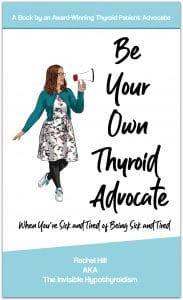
The book Be Your Own Thyroid Advocate: When You’re Sick and Tired of Being Sick and Tired, which builds on this article in detail and covers the ways in which you can take control of your thyroid health and symptoms to live a healthier, more vibrant life.
References:
[1] https://www.ncbi.nlm.nih.gov/pmc/articles/PMC6193522/

